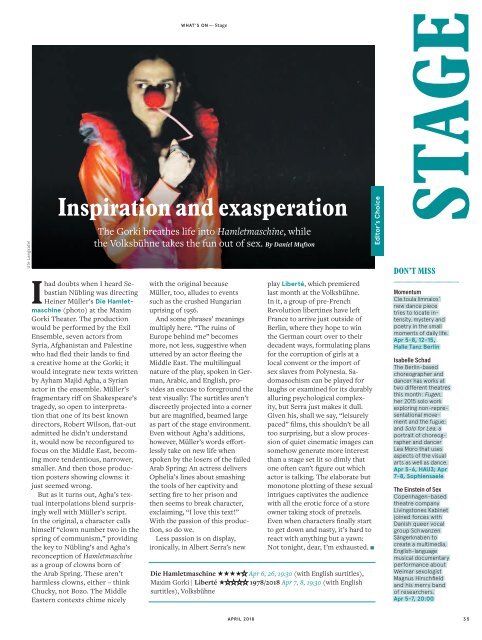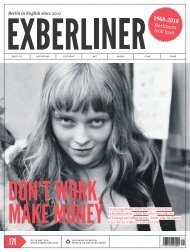EXBERLINER Issue 170, April 2018
Create successful ePaper yourself
Turn your PDF publications into a flip-book with our unique Google optimized e-Paper software.
WHAT’S ON — Stage<br />
Ute Langkafel<br />
Inspiration and exasperation<br />
I<br />
had doubts when I heard Sebastian<br />
Nübling was directing<br />
Heiner Müller’s Die Hamletmaschine<br />
(photo) at the Maxim<br />
Gorki Theater. The production<br />
would be performed by the Exil<br />
Ensemble, seven actors from<br />
Syria, Afghanistan and Palestine<br />
who had fled their lands to find<br />
a creative home at the Gorki; it<br />
would integrate new texts written<br />
by Ayham Majid Agha, a Syrian<br />
actor in the ensemble. Müller’s<br />
fragmentary riff on Shakespeare’s<br />
tragedy, so open to interpretation<br />
that one of its best known<br />
directors, Robert Wilson, flat-out<br />
admitted he didn’t understand<br />
it, would now be reconfigured to<br />
focus on the Middle East, becoming<br />
more tendentious, narrower,<br />
smaller. And then those production<br />
posters showing clowns: it<br />
just seemed wrong.<br />
But as it turns out, Agha’s textual<br />
interpolations blend surprisingly<br />
well with Müller’s script.<br />
In the original, a character calls<br />
himself “clown number two in the<br />
spring of communism,” providing<br />
the key to Nübling’s and Agha’s<br />
reconception of Hamletmaschine<br />
as a group of clowns born of<br />
the Arab Spring. These aren’t<br />
harmless clowns, either – think<br />
Chucky, not Bozo. The Middle<br />
Eastern contexts chime nicely<br />
The Gorki breathes life into Hamletmaschine, while<br />
the Volksbühne takes the fun out of sex. By Daniel Mufson<br />
with the original because<br />
Müller, too, alludes to events<br />
such as the crushed Hungarian<br />
uprising of 1956.<br />
And some phrases’ meanings<br />
multiply here. “The ruins of<br />
Europe behind me” becomes<br />
more, not less, suggestive when<br />
uttered by an actor fleeing the<br />
Middle East. The multilingual<br />
nature of the play, spoken in German,<br />
Arabic, and English, provides<br />
an excuse to foreground the<br />
text visually: The surtitles aren’t<br />
discreetly projected into a corner<br />
but are magnified, beamed large<br />
as part of the stage environment.<br />
Even without Agha’s additions,<br />
however, Müller’s words effortlessly<br />
take on new life when<br />
spoken by the losers of the failed<br />
Arab Spring: An actress delivers<br />
Ophelia’s lines about smashing<br />
the tools of her captivity and<br />
setting fire to her prison and<br />
then seems to break character,<br />
exclaiming, “I love this text!”<br />
With the passion of this production,<br />
so do we.<br />
Less passion is on display,<br />
ironically, in Albert Serra’s new<br />
play Liberté, which premiered<br />
last month at the Volksbühne.<br />
In it, a group of pre-French<br />
Revolution libertines have left<br />
France to arrive just outside of<br />
Berlin, where they hope to win<br />
the German court over to their<br />
decadent ways, formulating plans<br />
for the corruption of girls at a<br />
local convent or the import of<br />
sex slaves from Polynesia. Sadomasochism<br />
can be played for<br />
laughs or examined for its durably<br />
alluring psychological complexity,<br />
but Serra just makes it dull.<br />
Given his, shall we say, “leisurely<br />
paced” films, this shouldn’t be all<br />
too surprising, but a slow procession<br />
of quiet cinematic images can<br />
somehow generate more interest<br />
than a stage set lit so dimly that<br />
one often can’t figure out which<br />
actor is talking. The elaborate but<br />
monotone plotting of these sexual<br />
intrigues captivates the audience<br />
with all the erotic force of a store<br />
owner taking stock of pretzels.<br />
Even when characters finally start<br />
to get down and nasty, it’s hard to<br />
react with anything but a yawn:<br />
Not tonight, dear, I’m exhausted. ■<br />
Die Hamletmaschine ★★★★ Apr 6, 26, 19:30 (with English surtitles),<br />
Maxim Gorki | Liberté ★ 1978/<strong>2018</strong> Apr 7, 8, 19:30 (with English<br />
surtitles), Volksbühne<br />
Editor’s Choice<br />
DON’T MISS<br />
Momentum<br />
Cie.toula limnaios’<br />
new dance piece<br />
tries to locate intensity,<br />
mystery and<br />
poetry in the small<br />
moments of daily life.<br />
Apr 5-8, 12-15,<br />
Halle Tanz Berlin<br />
Isabelle Schad<br />
The Berlin-based<br />
choreographer and<br />
dancer has works at<br />
two different theatres<br />
this month: Fugen,<br />
her 2015 solo work<br />
exploring non-representational<br />
movement<br />
and the fugue;<br />
and Solo for Lea, a<br />
portrait of choreographer<br />
and dancer<br />
Lea Moro that uses<br />
aspects of the visual<br />
arts as well as dance.<br />
Apr 5-6, HAU3; Apr<br />
7-8, Sophiensaele<br />
The Einstein of Sex<br />
Copenhagen-based<br />
theatre company<br />
Livingstones Kabinet<br />
joined forces with<br />
Danish queer vocal<br />
group Schwanzen<br />
Sängerknaben to<br />
create a multimedia,<br />
English-language<br />
musical documentary<br />
performance about<br />
Weimar sexologist<br />
Magnus Hirschfield<br />
and his merry band<br />
of researchers.<br />
Apr 5-7, 20:00<br />
APRIL <strong>2018</strong> 35

















